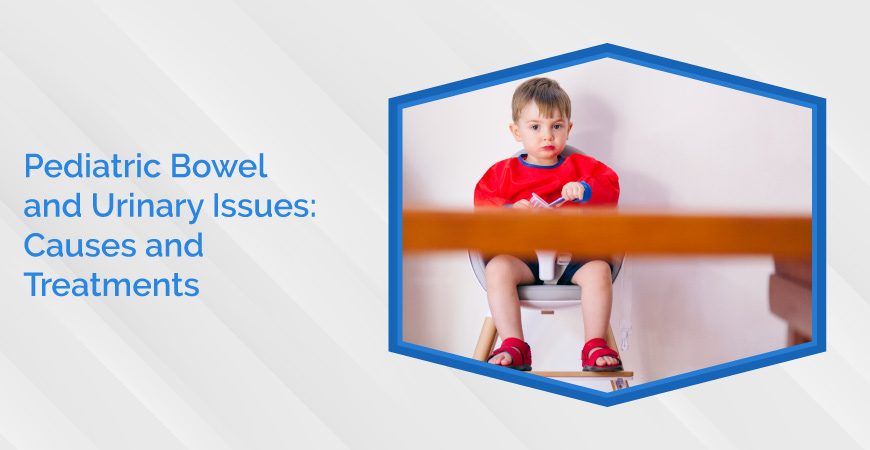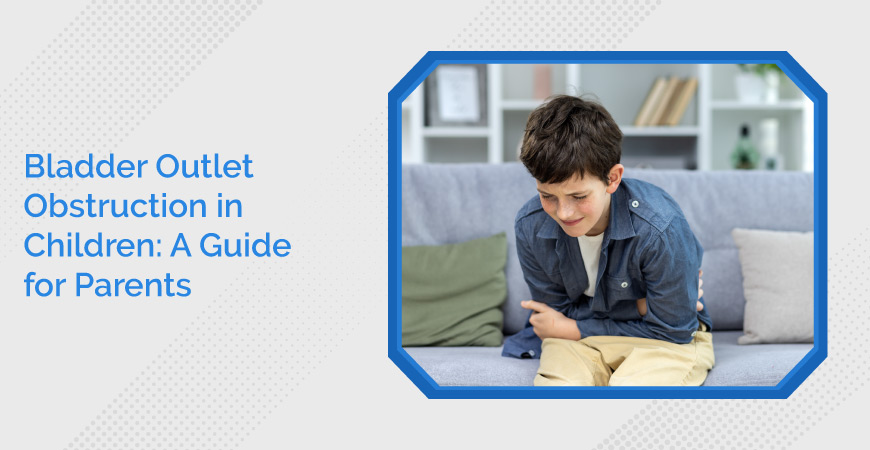
Pediatric Bowel and Urinary Issues: Causes and Treatments
Introduction
Parents want to see their children healthy as they grow up and through all stages of life. However, bowel and urinary problems in childhood are common issues that can affect the child’s quality of life and simultaneously turn into more severe conditions if not treated. If a child faces these problems, they must be diagnosed and treated as early as possible to avoid any further complications.
In this blog, we will look at several conditions falling under the categories of bowel and urinary problems children may develop, how to diagnose them, and where to go for proper treatment and prevention.
Concerned About Your Child's Bowel or Urinary Health?
I am here to help you navigate your child's bowel and urinary issues.
A] Types of Pediatric Bowel Issues
1. Constipation
- Causes:
Constipation in children often results from dietary habits, such as a lack of fiber or insufficient fluid intake. Stress, changes in routine, and withholding bowel movements due to fear or discomfort can also contribute.
- Symptoms:
Symptoms include infrequent bowel movements (less than three per week), straining during defecation, abdominal pain, or hard, dry stools.
- Treatment Options:
Treatment typically involves dietary adjustments, such as increasing fiber intake through fruits, vegetables, and whole grains and ensuring proper hydration. Mild laxatives or stool softeners may be recommended, along with behavioral therapy, to establish regular bathroom habits.
2. Diarrhea
- Causes:
Diarrhea is often caused by viral or bacterial infections, food intolerances (such as lactose intolerance), or even stress. - Symptoms:
Frequent loose or watery stools, abdominal cramps, and dehydration are key indicators of diarrhea. - Treatment Options:
Rehydration is critical, either through oral rehydration solutions or increased fluid intake. Depending on the cause, probiotics and anti-diarrheal medications may be prescribed to restore gut balance.
3. Irritable Bowel Syndrome (IBS)
- Symptoms:
IBS is characterized by alternating constipation and diarrhea, abdominal bloating, and pain. Symptoms often flare up during periods of stress or after consuming certain foods. - Management:
Managing IBS involves identifying and avoiding dietary triggers, reducing stress through mindfulness or relaxation techniques, and maintaining regular physical activity to promote healthy digestion.
4. Encopresis (Fecal Incontinence)
- Causes:
Encopresis is often linked to chronic constipation, which can cause stool leakage as softer stool passes around a blockage. Emotional stress or behavioral issues can also play a role. - Treatment Options:
Addressing the root cause—chronic constipation—is key. Treatment may include bowel retraining, dietary changes, therapy, and sometimes medications to clear blockages and prevent future incidents.
B] Types of Pediatric Urinary Issues
Urinary issues in children can range from minor inconveniences to more severe medical conditions requiring immediate attention. Here are some common concerns:
1. Urinary Tract Infections (UTIs)
- Causes:
UTIs occur due to bacterial infections affecting the urinary system, often linked to poor hygiene, constipation, or holding urine for extended periods. - Symptoms:
Symptoms include frequent urination, pain or burning during urination, cloudy or foul-smelling urine, and sometimes fever. - Treatment Options:
Antibiotics are the primary treatment for UTIs. Parents should also ensure the child stays well-hydrated and is educated about proper hygiene practices to prevent recurrences.
2. Bedwetting (Nocturnal Enuresis)
- Causes:
This common condition can stem from genetic factors, slow bladder development, or emotional stress. - Treatment Options:
Behavioral modifications, such as limiting fluid intake before bedtime and establishing bathroom routines, are often effective. Bedwetting alarms and medications may also be considered in persistent cases.
3. Urinary Incontinence
- Causes:
Urinary incontinence may result from an overactive bladder, stress, or constipation exerting pressure on the bladder. - Symptoms:
It is characterized by leakage of urine during physical activities, coughing, sneezing, or laughing. - Treatment Options:
Treatment includes pelvic floor exercises, medications to relax the bladder, and proper fluid management to avoid overloading the bladder.
C] How to Recognise and Address These Issues Early
Parents play a critical role in identifying early signs of bladder control problems. Warning signs include:
- Persistent abdominal pain, changes in bowel habits, or stool consistency.
- Painful urination, frequent accidents, or bedwetting past the typical developmental stage.
If these symptoms arise, seeking medical advice promptly is essential to receive an accurate diagnosis and appropriate treatment.
D] Treatment Approaches and Support
Treating bowel and urinary issues in children often involves a combination of lifestyle changes, behavioral interventions, and medical care.
1. Lifestyle Changes
- Dietary Adjustments: Increasing fiber intake for constipation or encouraging hydration for urinary health can make a significant difference.
- Physical Activity: Regular exercise can promote healthy digestion and bladder function.
- Establishing Routines: Encouraging regular bathroom habits helps children feel more in control of their bodily functions.
2. Behavioral Therapy
For children struggling with toilet training or stress-related symptoms, behavioral therapy can be a valuable tool. Psychological support may also be helpful for children facing anxiety-related bowel or pediatric urinary problems.
3. Medical and Surgical Interventions
In severe cases, medications or surgical interventions may be necessary. Pediatric specialists, such as gastroenterologists, urologists, or psychologists, can provide tailored treatment plans for complex conditions.
E] Preventive Measures for Long-Term Health
Prevention is the cornerstone of pediatric care. Parents can reduce the likelihood of child bowel movement problems by:
- Educating children about proper hygiene, healthy eating habits, and regular bathroom routines.
- Scheduling regular check-ups to monitor their development and address emerging concerns early.
Concerned About Your Child's Urinary Health?
I am here to assist you with your child's urinary concerns.
Conclusion
Bowel problems in children and urinary issues are common but manageable health concerns when addressed promptly. Early recognition, lifestyle adjustments, and a proactive approach to treatment can prevent complications and help children thrive. By staying informed and seeking support when needed, parents can ensure their children enjoy a happy, healthy childhood free from the discomfort and stress of these conditions. Contact us today.
Dr. Gursev Sandlas
Hello, I'm Dr. Gursev Sandlas, a Pediatric Surgeon and Pediatric Urologist based in India. My areas of expertise include Pediatric Hepatobiliary surgery, minimal access surgery, and robotic procedures. Also, I offer specialized services in addressing bed-wetting issues and providing antenatal counseling.



